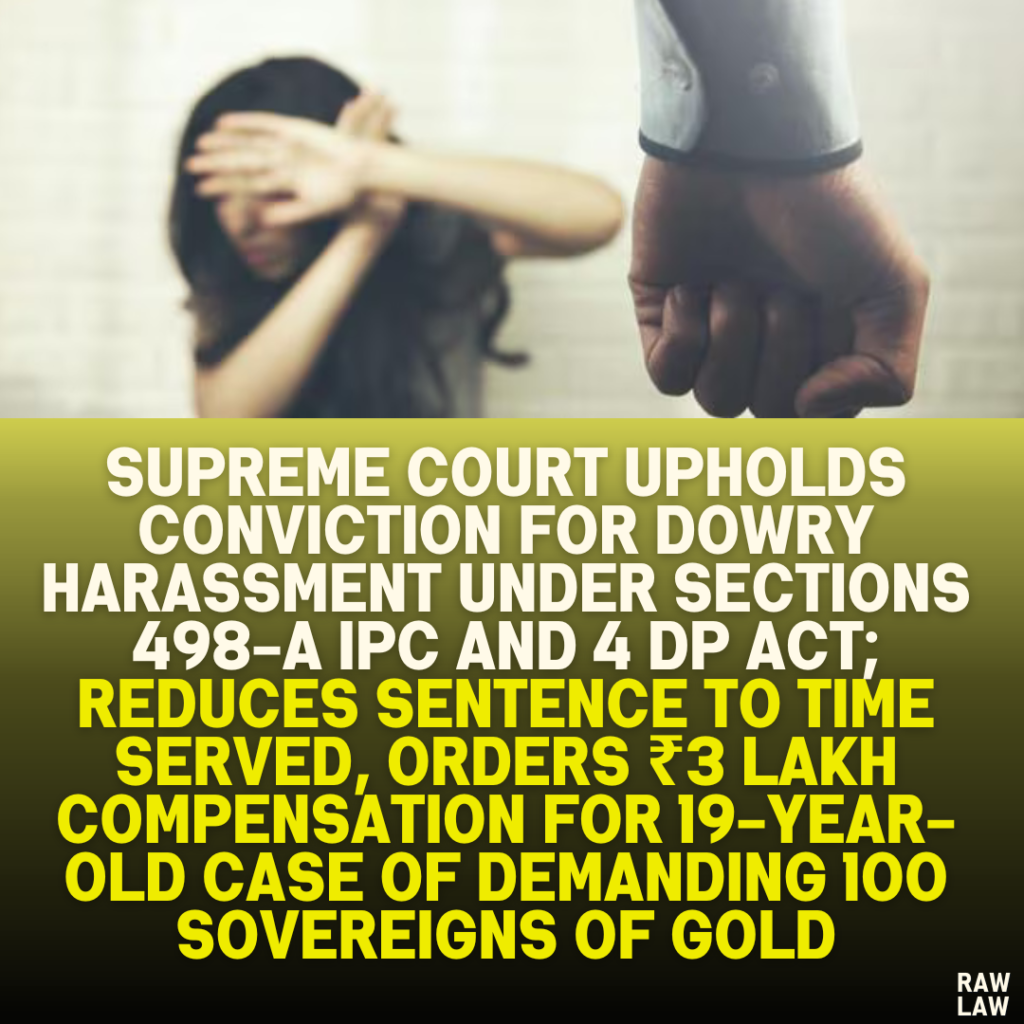Court’s Decision
The Supreme Court:
- Confirmed the conviction of the appellant under Section 498-A IPC (cruelty by husband or relatives) and Section 4 of the Dowry Prohibition Act (demand for dowry).
- Modified the sentence: Reduced the imprisonment term to the period already undergone in custody (approximately three months).
- Directed the appellant to pay ₹3,00,000 as compensation to the complainant within four weeks. If the appellant fails to comply, the appeal will be dismissed, and he will have to serve the remaining sentence.
Facts
- The appellant married the complainant on March 31, 2006, but the marriage lasted only three days due to dowry-related disputes.
- The appellant and his family allegedly demanded 100 sovereigns of gold as dowry, exceeding what was initially agreed upon (60 sovereigns for the bride and 10 for the groom).
- The complainant alleged harassment, threats, and humiliation, including incidents during the wedding reception and the bride being abandoned on the dais.
- It was further alleged that the appellant suppressed details of his earlier marriage and later sought alliances in 2006 while still married to the complainant.
- The trial court convicted the appellant under Sections 498-A, 406 IPC (criminal breach of trust), and Section 4 of the DP Act. On appeal, the conviction under Section 406 IPC was set aside, but the conviction under Section 498-A IPC and Section 4 DP Act was upheld.
Issues
- Whether the evidence presented by the prosecution sufficiently established the appellant’s guilt under Sections 498-A IPC and 4 DP Act.
- Whether the sentence imposed was proportionate, given the prolonged litigation, brief cohabitation, and special circumstances of the case.
Petitioner’s Arguments
- Insufficient Evidence: The appellant argued that the evidence did not establish cruelty or harassment under Section 498-A IPC.
- Prolonged Litigation: The case, filed in 2006, spanned 19 years. The complainant had since remarried and settled abroad, making further incarceration unwarranted.
- Special Circumstances: The appellant requested leniency in sentencing, citing a short marriage duration and his cooperation during the trial.
Respondent’s Arguments
- The State relied on clear evidence of dowry demands and harassment from the complainant (PW-4) and corroborating witnesses, including family members and friends.
- The consistent findings of the trial court and High Court on the appellant’s culpability justified the conviction and the sentence imposed.
Analysis of the Law
- Section 498-A IPC: This section penalizes cruelty by a husband or his relatives intended to coerce a woman into meeting unlawful demands. The court found that the appellant harassed the complainant with repeated demands for dowry (100 sovereigns of gold).
- Section 4 DP Act: This section criminalizes any dowry demand made directly or indirectly. The testimonies of the complainant, her family, and friends consistently pointed to demands exceeding the agreed dowry, establishing the offense.
- The court concluded that both provisions were satisfied based on overwhelming evidence.
Precedent Analysis
The court referenced Samaul Sk. vs. State of Jharkhand & Anr. (2021 INSC 429), where:
- The sentence was reduced to the time already served.
- Compensation was voluntarily offered by the appellant to the complainant.
Although no voluntary offer was made in the present case, the court exercised its discretion to direct compensation, balancing justice with special circumstances.
Court’s Reasoning
- Evidence Assessment: Testimonies of key witnesses, including the complainant, her family, and others, established repeated dowry demands, harassment, and abandonment of the bride during the marriage.
- Passage of Time: The court considered that:
- The incident occurred 19 years ago (2006).
- The complainant had remarried and settled abroad, moving on with her life.
- The appellant, a professional, had reintegrated into society and showed willingness to perform community service.
- Balancing Justice: While upholding the conviction to affirm the principles of law, the court reduced the sentence to avoid further incarceration given the unique circumstances.
- Compensation: Recognizing the harm caused to the complainant, the court directed monetary compensation as a form of restorative justice.
Conclusion
The Supreme Court:
- Sustained the appellant’s conviction under Sections 498-A IPC and 4 DP Act.
- Modified the sentence to the time already served.
- Directed the appellant to deposit ₹3,00,000 as compensation for the complainant within four weeks. Non-compliance would result in dismissal of the appeal and the appellant serving the remaining sentence.
Implications
- Affirmation of Women’s Rights: The judgment reinforces the legal framework protecting women from dowry-related harassment.
- Compensation for Victims: It highlights the court’s willingness to impose monetary compensation in addition to criminal penalties.
- Balancing Justice and Circumstances: The court’s decision reflects a compassionate approach, considering the passage of time and the need to rehabilitate rather than solely punish.




Pingback: Bombay High Court Orders Strict Enforcement of Noise Pollution Laws: "Use of Loudspeakers is Not an Essential Part of Any Religion," Reaffirms Right to a Peaceful Environment Over Religious Practices - Raw Law
Pingback: Bombay High Court Directs CBDT to Ensure Flexibility in E-Filing Utilities for Claims under Section 87A: “Taxpayers Cannot Be Denied Their Right to Self-Assessment” - Raw Law